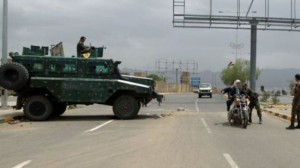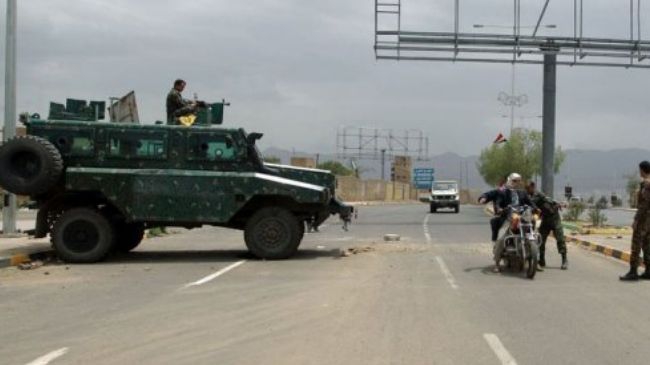 Ever since Washington announced on August 1 it would close down several of its diplomatic posts across the Middle East and most specifically Yemen in response to an aggravated terror threat, the media have been in a frenzy, alleging that al-Qaeda was intent on targeting foreign interests both at home and abroad to revenge the death of one of its leaders, Said al-Shihri.
Ever since Washington announced on August 1 it would close down several of its diplomatic posts across the Middle East and most specifically Yemen in response to an aggravated terror threat, the media have been in a frenzy, alleging that al-Qaeda was intent on targeting foreign interests both at home and abroad to revenge the death of one of its leaders, Said al-Shihri.Al-Shihri was reported dead by al-Qaeda in July. It was Ibrahim al-Rubaish, the terror group' spokesman who confirmed in a video statement his death to the world. He said, ""I present my condolences to all the Mujahideen on the martyrdom of Said al-Shehri who was killed in a US drone attack."
As news of Washington's decision to close its embassies across most of the Arab world started to spread, the UK, France and Germany decided too to jump on the bandwagon, announcing they too felt necessary to suspend all activities in Yemen in light of such "worrying intelligence reports."
Within days the Yemeni capital, Sana'a, was brought to a virtual standstill by the military as armored vehicles began flooding the streets and the armed forces moved into their positions.
On Tuesday, five days after the first terror alarm was sounded by US President Barack Obama, Yemenis woke up to find their capital under military siege, their skies overtaken by US drones.
Interestingly enough, while the US State Department and the British Foreign Office were both very keen on sharing their information with the press, Yemen President Abdo Rabbo Mansour Hadio was nowhere to be seen ... Let alone heard.
At the midst of Yemen's most intense terror crisis, Yemen President Hadi, the Commander in Chief of the Armed Forces remained elusive; rather puzzling giving the stakes.
When the US announced Tuesday it would evacuate all "non-essential staff" from the embassy, Yemenis immediately assumed that something seriously wrong was indeed at play. After all, no country would stage such a dramatic exit unless al-Qaeda was literally on its heels. Within hours the UK chose to recall its staff, urging all its nationals to immediately fly out of Yemen.
�Due to increased security concerns, all staff in our Yemen embassy have been temporarily withdrawn, and the embassy will remain closed until staff are able to return,� a UK Foreign Office spokesman told the press on Tuesday. A later report read, �If you don�t leave the country now while commercial carriers are still flying it is extremely unlikely that the British government will be able to evacuate you or provide consular assistance."
The threat
With the press hunting for clues, US intelligence officials candidly revealed that their services had intercepted a conversation in between two top al-Qaeda operatives --Ayman Mohammed Rabie al-Zawahiri and Nasser al-Wuhayshi -- in which they allegedly discuss an imminent revenge attack against foreign interests both in Yemen and abroad.
Security analysts speculated that al-Qaeda plans to target Guantanamo Bay Penitentiary - America's infamous terror detention center - referring to a recent audio message made by Ayman al-Zawahiri where he warned the US of reprisals for its crimes against Gitmo detainees.
On Wednesday, a US official told International Business Times, "The Yemeni branch of al-Qaeda has developed a new hard-to-detect liquid explosive that might be used in future terrorist attacks."
Senior US security officials then explained that "Clothes dipped in the liquid reportedly became explosive devices when dry and might be worn by suicide attackers." Such technology would essentially turn anyone into a terror suspect and make prevention and detection a logistical nightmare.
At this point the dots began to join up and a picture to form.
Boots on the ground?
Faced with a new technology it could not counteract or detect the United States of America and its allies in the region chose to put the safety of their nationals above all else by staging what has been so far the biggest rescue operation in well-over a decade.
But then security analysts raised fair questions - Why would the US willingly divulge classified information to the broader public? Why would the US, a country which for the past decade has hidden behind the smoke screen of national security suddenly risk to jeopardize its positions in the region to ease the public's fears and answer reporters� questions?
Lastly, why would the US tip al-Qaeda and risk drive its militants underground?
With journalists busy reporting on the spectacle that had become Yemen, observers in Washington tipped the BBC that the Pentagon may be preparing a JSOC - Joint Special Operation Command - strike within Yemen.
Sources allege that the US is looking to send troops to Yemen to carry surgical strike operations, moving well beyond its initial counter-terror agreement with the Yemeni government.
So far the US has only sent training groups to Yemen; the Obama administration has always maintained that its aim was to support and train Yemeni troops not act on their behalf. It appears now that Washington's counter-terror policy in the region has evolved.
Interestingly enough the US chose to evacuate its staff with an Air Force C-17, a highly versatile aircraft which can be rapidly reconfigured between transporting passengers and heavy equipment. C-17 have been used by the military to carry a wide range of vehicles, palletized cargo, paratroops, air-drop loads and aeromedical evacuees.
With only a 100 US government personnel to be evacuated the Pentagon could have very well opted for a regular commercial plane, instead it commissioned a C-17, an aircraft which can carry up to 77,519kg.
Jim White, a blogger specializing in counter-terrorism theorized that the Pentagon would have used the C-17 to parachute US troops into Yemen under the cover of darkness - the airlift took place at dawn on Wednesday -, something which falls in line with recent reports coming from Washington.
Moreover, US officials have warned that in the light of recent developments, Guantanamo Bay Yemeni detainees would likely stay put as repatriation talks will stall. Daniel Green, an expert on Yemen at the Washington Institute for Near East Policy said on the matter, "It's not likely to happen."
Senator Saxby Chambliss, the ranking Republican on the Senate Intelligence Committee reinforced such statement by stressing, "Sending them [Yemeni prisoners] to countries where al-Qaeda and its affiliates operate and continue to attack our interests is not a solution."
So as Yemen terror threat will die down since Sana'a announced it had successfully foiled al-Qaeda's plot to overtake several of its cities and target its oil industry, Yemenis might soon find out that August super-threat set the stage for a US military operation on its territory, prevent the return home of its nationals from Guantanamo and essentially assert America's hold on the country's internal affairs.
By Press TV
The Iran Project is not responsible for the content of quoted articles.











